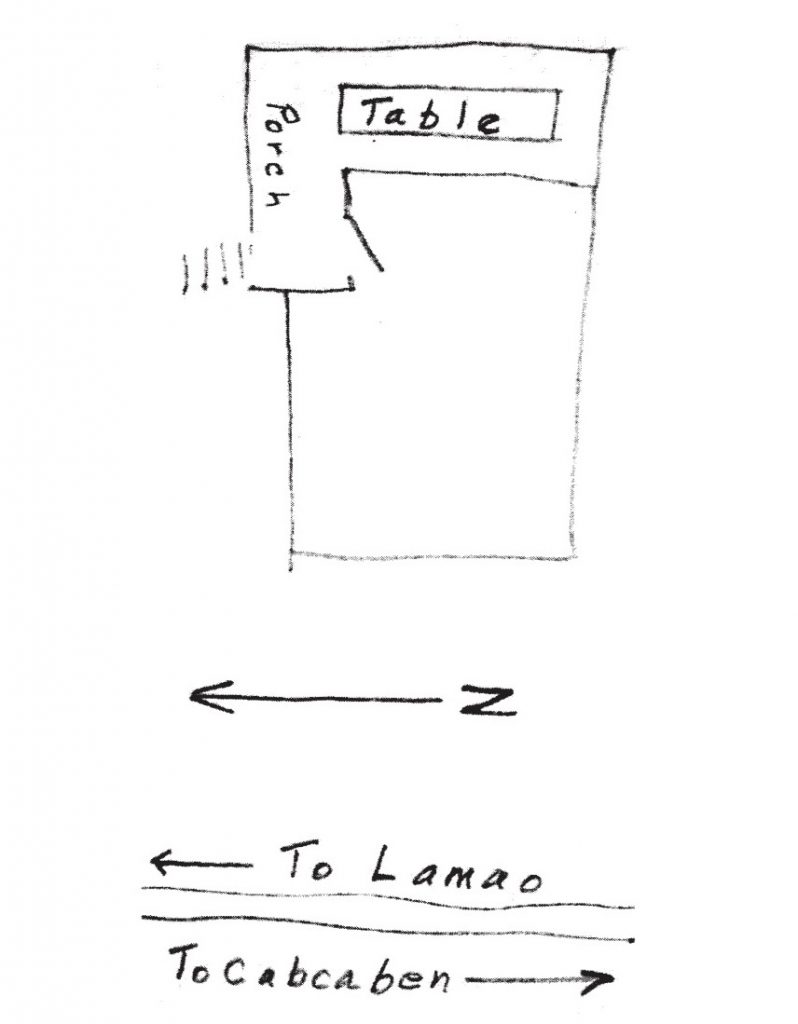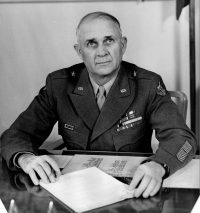The attack came last night at 11:15. The artillery began to pound us heavily again and the Japs landed at North Point, on the tail of the island. For a time it seemed that we might hold them, but by daylight it was apparent that they had landed in too great force to be ejected by troops available to us. They moved steadily toward the west end, using artillery and tanks, and at 10:30 Gen. Wainwright decided to surrender to avoid a slaughter if they came into the tunnel. An officer went out with a flag of truce to see if the senior Jap officer would come in and talk it over. He sent back word that Gen. Wainwright was to come out to see him. Gen. W. and Gen. Moore with their aides went out about 2:00 p.m. All this time fighting was still in progress. The Jap officer demanded surrender of all the Philippines but Gen. W. stated that Sharp and Mindanao were no longer under his command and requested that arrangements be made for a conference with Gen. Homma who commands Imperial Forces in the Philippines. Arrangements were made for Gen. W. to go to Bataan to meet Gen. Homma. Col. Pugh came back to the tunnel about 2:30 p.m. where I met him. Pugh was to get the General’s baggage and follow on over to Bataan in the crash boat. We packed up and left South dock as soon as possible. In the party were myself, Pugh, Maj. Lawrence, and three orderlies to look after baggage. When we arrived at Cabcaben no one was in sight. Pugh and I, with Sgt. Carroll carrying a white flag, went on up the dock toward the town, not knowing but what we might be fired upon at any moment, as the end of the dock was barricaded. However, the town also was deserted. We went on out to the main highway where we saw a truck. The driver could not speak English. Presently a staff car came by carrying [Japanese] newspaper men. They questioned us and took a few pictures of us. Then a truck arrived carrying several [Japanese] officers. We explained that we wanted to go where the conference was to be held with Gen. Homma. Finally they put us on the truck and took us to Lamao where a higher headquarters was located. After a few minutes they put us on the truck again and started back to Cabcaben. All this time would tell us nothing as to where we were going.
On arriving at Cabcaben we de-trucked at a small house on the northern end of the barrio, and there we found Gen. Wainwright. Gen. Homma had not yet arrived. During this period we had been treated courteously, and we found that the Japanese officers who took us to Lamao were good-natured and full of fun. We exchanged cigarettes with them and talked, as best we could, during the entire trip. We waited a considerable time at Cabcaben before Gen. Homma arrived. Shortly before he came we were lined up on the walk in front of the house and pictures were taken. We remained in front of the house until after Gen. Homma arrived and had taken his seat at a previously prepared long table on the porch. The arrangement of house and porch is as in the sketch below.

After Gen. Homma and his staff were seated we were told to come up and take our places on the opposite side of the table. We were arranged thus:

All discussion which followed was through an interpreter who was an officer in the Japanese army. Gen. Homma asked if Gen. W. was prepared to surrender all the forces in the P.I. Gen. W. replied that he was not in position to surrender all the forces in the P.I. as he was not in command of all of them. Gen. Homma asked if he had not been in command of all the P.I. as it was generally understood that Gen. W. commanded everything in the islands. Gen. W. replied that he had been in command of all the troops here, but that the force under Gen. Sharp in Mindanao and Visayan had been transferred to Gen. MacArthur. Gen. Homma said he did not understand how that could be done and he was not prepared to negotiate for anything except surrender of all troops in the Philippines. Gen. W. asked what will be the alternative if he did not surrender all the troops. At the question Gen. Homma smiled slightly and looked around the table at members of his staff. The officer on his left handed him a paper which he read and in turn handed to the interpreter who translated. In general, the statement was as follows: “The Imperial Japanese forces are prepared to negotiate only for the surrender of all United States forces in the Philippine islands.” Gen. W. replied that he could not surrender all forces even if he so desired as he had no means of communicating with them. He was asked if he would surrender all troops if the means of communication were provided. He replied that he was willing to send an officer to Mindanao by plane—there, through radio at Gen. Sharp’s headquarters to communicate with Gen. MacArthur and strongly recommend that all forces in the Philippines be surrendered.
There followed considerable discussion in Gen. Homma’s staff which I could not understand as it was all in Japanese. Thereafter, Gen. Homma stated that as he had come prepared to accept the surrender of all forces in the Philippines, and as such a surrender had not been tendered he was terminating the conference. He then stood up and left the porch, followed by the members of his staff. In less than a minute Gen. Homma and his staff were in cars en route to Manila. We had immediately left the porch and followed the Japanese officers to the lawn as we were all shocked at the abrupt ending of the conference. We found the interpreter and asked him what we were supposed to do as there had been no decision. He said we could go back to Corregidor and do anything we desired, and we were given to understand that as the negotiations had failed, the Japanese attack would continue. Since all our weapons had already been destroyed we were in no position to continue a defense, and Gen. W. told them that he was prepared to submit at once a written surrender of all forces in the Philippines. However, they would not accept it there, and stated that the surrender must be submitted to the commanding officer of Japanese troops on Corregidor. It was therefore necessary for us to return to Corregidor.
We therefore went back to the dock, and as the crash boat was sinking we took a Japanese boat. By this time it was dark—about 8:30. We had to land on the Japanese end of the island as we might be fired upon if we approached the west end. As we neared the island I became seasick or a combination of seasickness and something else. The boat was beached in about a foot of water and we had to walk ashore. Then we were marched in column of twos toward the tunnel. Before we reached the tunnel we were halted, and Gen. W. was taken to the Japanese headquarters where he wrote out the formal surrender. I did not go with him as I was still too ill. Thereafter we were all taken to the tunnel and restricted to our own sleeping quarters in lateral #10. Gen. W. was confined to his own room with a guard on the door. While we were gone during the afternoon, the Japs had entered the tunnel and taken over everything. It was about midnight when we returned.
